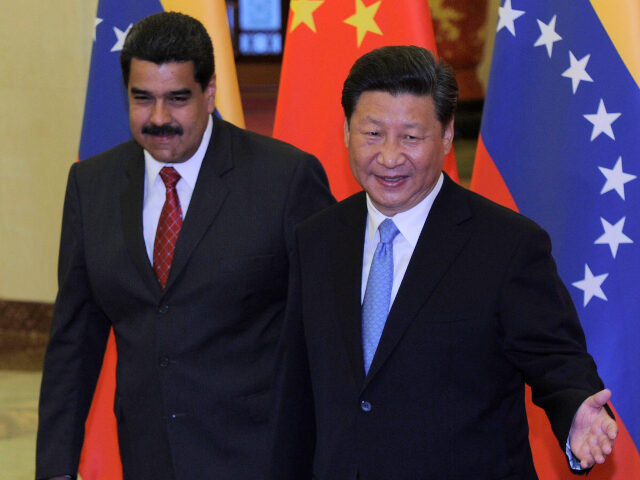The socialist Maduro regime sent a delegation to China seeking investments to reactivate and boost Venezuela’s run-down oil industry, according to a report published by Bloomberg on Tuesday.
The report, which cites two sources with direct knowledge of the matter, states that the pursuit of Chinese funds is part of socialist dictator Nicolás Maduro’s efforts to revive the nation’s crumbling economy ahead of next year’s “free and fair” presidential election. Maduro will seek to be re-elected for a third six-year presidential term after clinging to power through a sham presidential election in 2018.
The Venezuelan delegation, led by Vice President Delcy Rodriguez and Oil Minister Pedro Tellechea, arrived in Shanghai on Tuesday — the first high-level Venezuelan delegation of its kind to visit China in five years.
Rodríguez and Tellechea are reportedly discussing possible joint ventures between Chinese companies and the state-owned Petróleos de Venezuela (PDVSA) oil company:
According to Bloomberg, Venezuelan Oil Ministry officials have been closely working with officials from China’s National Petroleum Corporation (CNPC) since at least May on establishing a revamped pipeline deal that would allow for the direct trading of oil between both countries without the need for intermediary third parties.
Venezuela is home to the largest proven oil reserves in the world, estimated at more than 300 billion barrels. Its oil industry, however, has been brought to near-ruins in recent years as a result of more than two decades of socialist mismanagement, which caused Venezuela’s oil output to steadily decline.
In 2019, the administration of former President Donald Trump imposed sanctions on PDVSA in response to myriad human rights violations committed by the socialist regime against its own people.
The administration of President Joe Biden eased some of the sanctions imposed on PDVSA in November 2022, allowing California-based Chevron to resume oil production and export Venezuelan oil to U.S. markets.
The sanctions relief granted by the Biden administration has allowed the Maduro regime to boost its oil output, which recently reached a “stable” point not seen since 2020.
China has been reportedly helping the Maduro regime avoid U.S. oil sanctions since at least 2020, shipping millions of its sanctioned oil barrels to China via Chinese state-owned defense firm vessels to help offset its remaining undisclosed debts to the Asian nation, which were estimated at $20 billion in 2019.
The encounter between Venezuelan and Chinese officials to discuss ways to reactivate and boost Venezuela’s oil industry follows reports published at the end of August indicating that the Biden administration has been holding talks with the Maduro regime, offering a temporary lifting of oil sanctions in exchange for a “free and fair” election in Venezuela.
The reports were confirmed by Deputy Assistant Secretary of State for Western Hemisphere Affairs Juan González this week.
China has been a key financier of the Venezuelan socialist regime and its previous ruler, the late dictator Hugo Chávez, with Venezuela borrowing more than $60 billion from China in oil-for-loan deals as of 2015.
China reportedly stopped lending money to Venezuela in 2016, noting “deteriorating economic conditions” in the country as a result of the inexorable collapse of socialism in the country that obliterated its economy.
In August, Maduro offered Venezuela’s oil reserves to the China-led BRICS economic and security bloc, hoping to entice the group into allowing Venezuela to join the coalition.
Maduro had previously offered Venezuela’s farmlands to prospective BRICS investment to help restore them after the socialist regime seized more than nine million hectares of privately owned farmlands over the course of two decades, placing them at the hands of regime loyalists who, without any regard for technical capacity, obliterated the once productive lands — forcing Venezuela to import products that it was once capable of producing on its own.

COMMENTS
Please let us know if you're having issues with commenting.